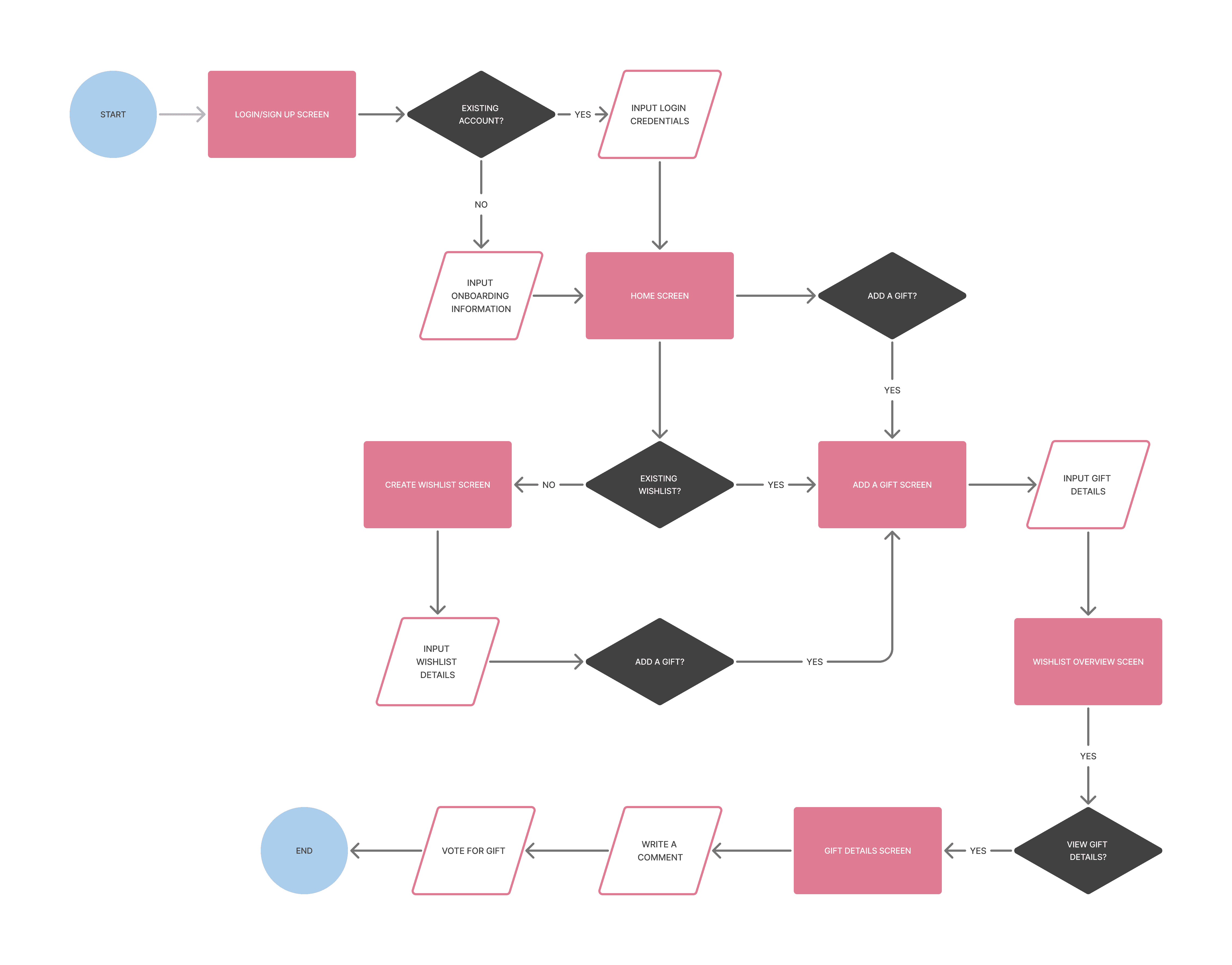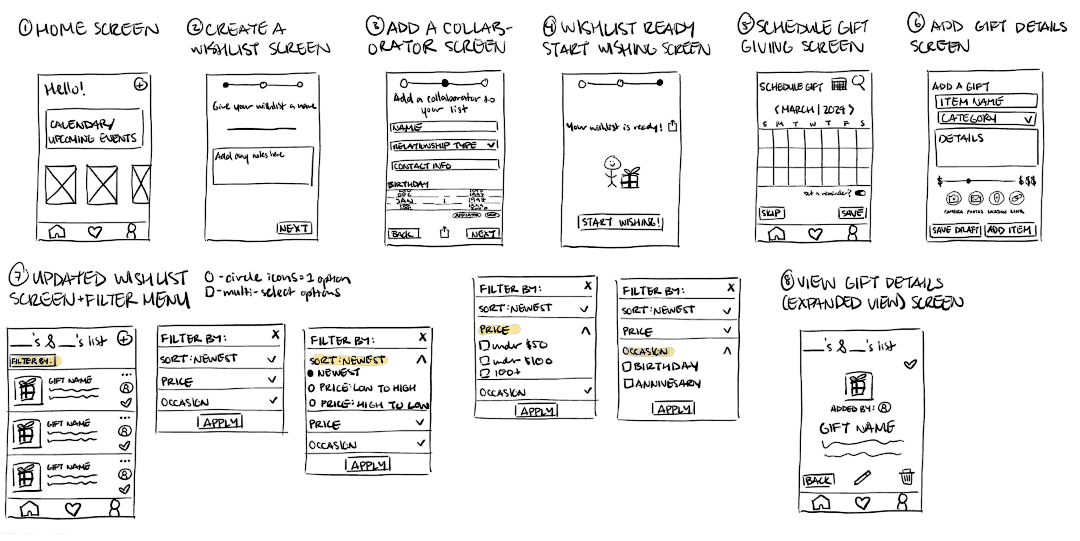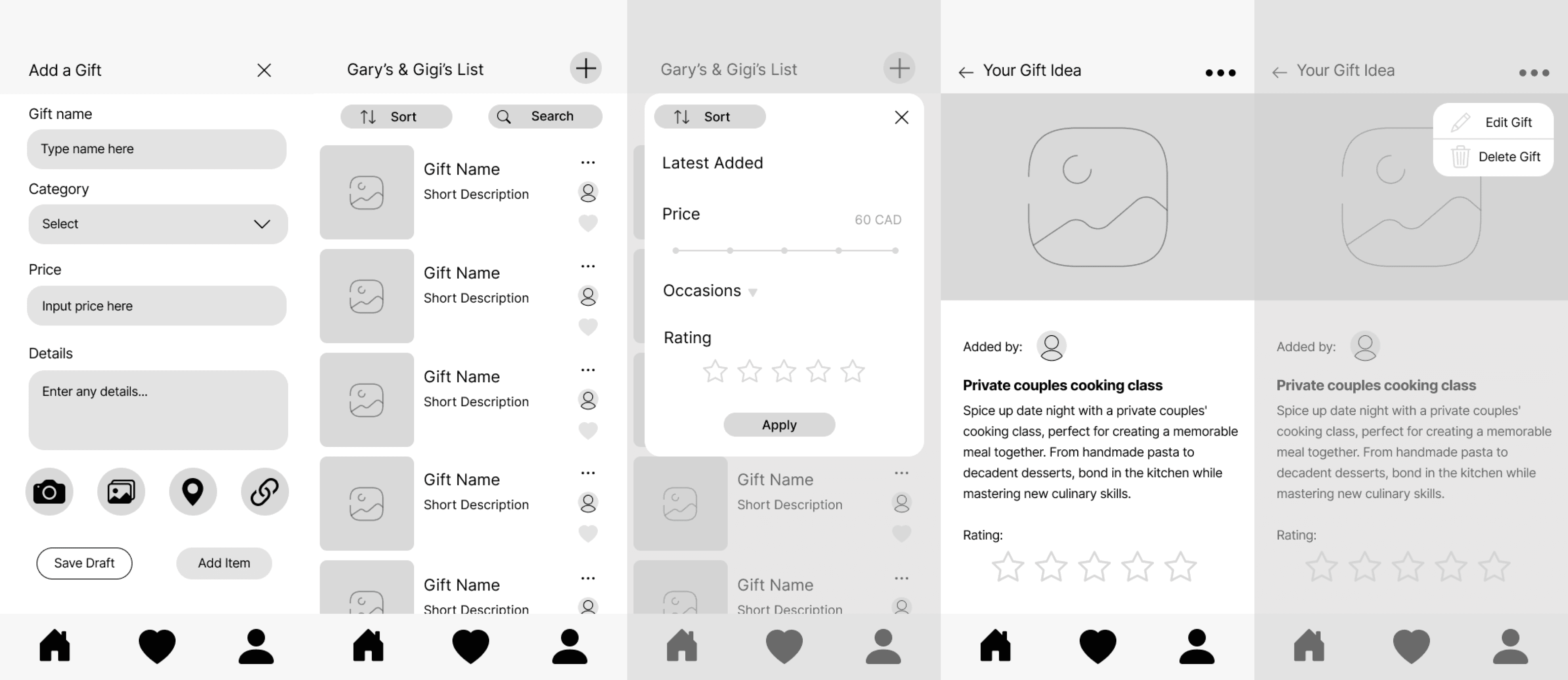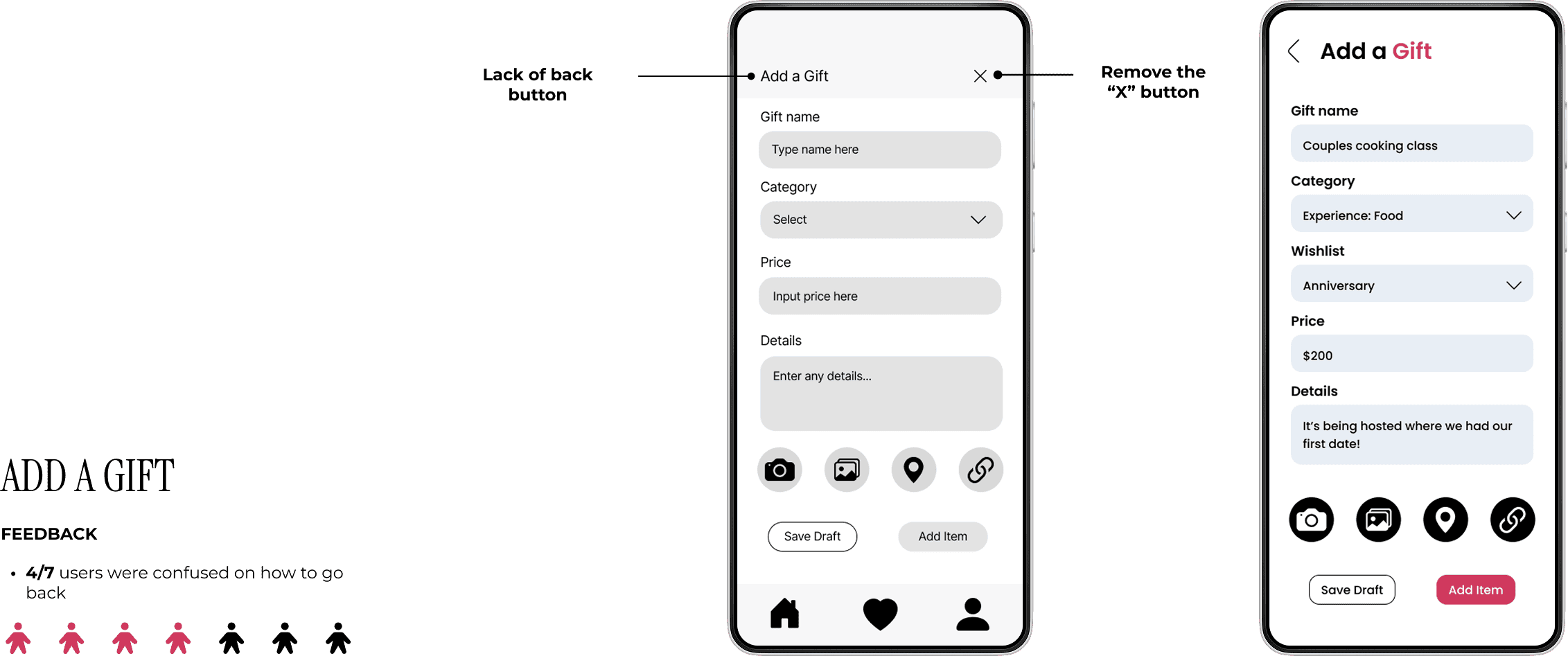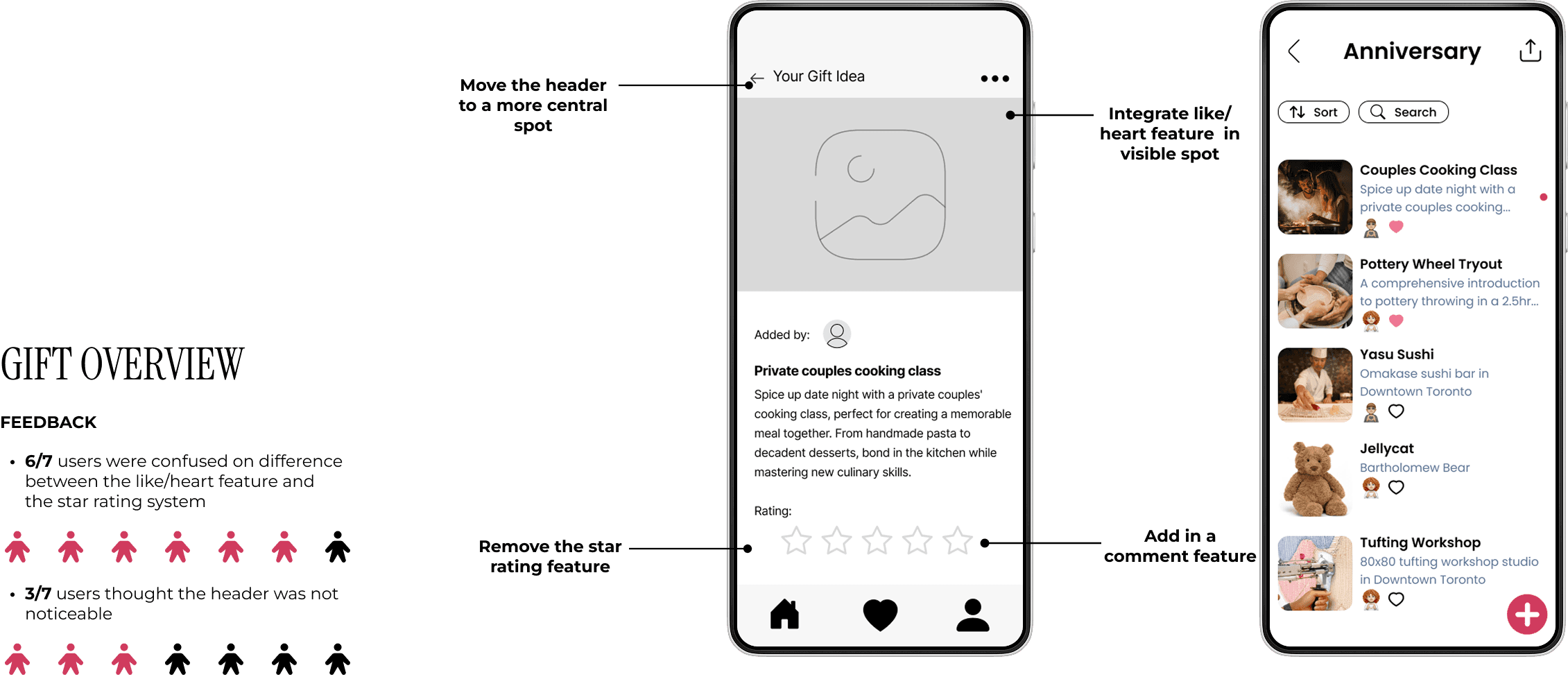UX Designer | Academic Project | Team
Alleviate the pressure and uncertainty associated with the gift-giving experience.
Timeline
4 Months: Sept - Dec 2024
Team
Ariba Malik
Joanna Lau
Peter Huang
Yi Liu
Role
Secondary research
User research interviews
Low, mid, and high-fidelity prototypes
Usability testing
Branding
Visual design
Problem
We’ve all been there, wanting to give a meaningful gift, only to second-guess ourselves and settle for something “safe.”
While humans truly value sentimental and experienced-based gifts, many often struggle with gift-giving anxiety and opt to give ones that feel practical but miss the deeper, personal connection.
Challenge
This gap between intention and perception raises an opportunity….
How can we alleviate the stress and uncertainty from the gift-giving process, while helping people create more meaningful, emotionally resonant experiences?
Solution
We wanted to build a product that eliminates the dreaded "what if they don't like it?" feeling during the gift-giving process without losing the surprise and delight element.
Discover
Our extensive research phase consisted of both primary and secondary research to gain insight into the key issues people face during the gift-giving process.
Background Research
To understand existing theories and insights on gift-giving behaviour, we conducted 15 in-depth literature reviews, guided by four main research questions.
Competitor Analysis
Competitor analyses were conducted on 4 pre-existing gift apps, such as Gift.com, Giftadvisor, Tinggly, and Gift Guru to gauge insight on commonalities, opportunities, and gaps.
User Interviews
Leveraging our research from our primary research, we conducted 10 user research interviews to further explore pain points with real-life experiences.
BACKGROUND RESEARCH
Guided by the research questions below, background research revealed several common insights:
What makes a gift cherished?
Gifts are cherished for thoughtfulness and sentiment. Shared experiences and suprises create lasting memories.
How do people select gifts?
Close relationships inspire personalized gifts. Practical constraints lead to practical, "safe" choices.
What challenges do givers face?
Time, budget, and fear of misalignment with recipient cause stress to gift givers.
How do givers balance intention vs. expectations?
Practicality is prioritized to reduce risk. Recipients value creativity and emotional connection.
COMPETITOR ANALYSIS
Due to lack of direct competitors, we analyzed four general gift-giving platforms, each with unique selling points/features. This helped us determine what insights to act on, and what we can offer to fill any market gaps.
Click each card to view features and gaps.
USER INTERVIEWS
Interviews were conducted with 10 participants that have given or received a special gift in the last 12 months to/from a close relationship. We wanted to understand the experiences, challenges, and behaviours from both perspectives of gift-giving: recipients and givers.
We learned that…
Gifting in romantic relationships is most common and cherished.
5/10 state their main gift-giving relationship is with a significant other
7/10 are more thoughtful and intentional with gifts for closer relationships
The perfect gift is…
7/10 believe the best gift is an experience/quality time spent together
7/10 cherish gifts with meaning (thoughtful, personalized/custom, handmade, emotional)
5/10 emphasized the surprise element is also crucial for a memorable gift
The biggest challenge is the mental hurdle.
7/10 raised concerns and doubts of picking the "wrong" gift
Finances and budgeting is the #1 logistical constraint.
10/10 all mentioned finances and budgeting play a factor in choosing a gift
AFFINITY MAPPING
Swipe to see full interview data (affinity mapping).

Define
USER PERSONAS
Based on our key findings and interviewees, we created two hypothetical users. Meet "The Couple": Gary (The Gift Giver) and Gigi (The Gift Receiver).
Ideate
PRIORITIZATION MATRIX
I led the team in a brainstorming session where we wrote down every potential features the app could include. Each prompt was evaluated based on its impact and feasibility, allowing us to plot them on the prioritization matrix. This approach ensured that our design decisions were data-driven, focused on high-value features, and aligned with user needs and project goals.

PRIORITY FEATURES
After understanding our users, I was able to scope down our focus on three main priority features that would have the most impact on users but also be feasible within our constraints.
Shared Wishlist
Allows users to collaborate on a wishlist together, each contributing their own ideas with details (description, price, image, location, etc.)
Calendar + Event Scheduling
Calendar feature enables users to input important dates and set notification reminders for these upcoming dates.
Like + Comment
Gives users the opportunity to express their opinion on gift ideas with likes and comments without eliminating the surprise factor.
Design
USER TASK FLOW
With the priority features in mind, I mapped out potential user task flows to explore how a user would initiate a collaborative wishlist and proceed to add an item to it. I selected this task to highlight the app’s MVP features.
The focal point of our solution is a collaborative wishlist. By providing both users with insight into the other person’s preferences, it alleviates the uncertainty, pressure, and anxiety behind gift-giving without taking away the surprise and delight.
LOW FIDELITY SKETCHES
The information gathered from our task flows was used to guide my design decisions for the initial sketches.
MID FIDELITY WIREFRAMES
The sketches were then translated into mid-fidelity wireframes.
Test + Iterate
USABILITY TESTING
We then conducted user flow testing with 7 participants to refine the design before moving into the final iteration. We also presented our prototype to experts for additional feedback, and I was responsible for the prototype walk through presentation. This provided insight into improvements for our iteration that will make the user experience more seamless.
See below for the key screens and the changes made.
Style, Colours, and Typography
MOODBOARD
The moodboard was a collaborative effort to decide on a cohesive “vibe” and colour palette using shared vision words that we wanted the interface to embody:
Shared Vision Words
Romantic
Heartfelt
Welcoming/inviting
Joyful
Organized
Intimate
DESIGN SYSTEM
We knew the UI should use muted, romantic colours with simplistic, modern typography; we decided on a deep raspberry pink and a dusty blue for our core colours. We kept the typeface consistent with Poppins for a uniform, cohesive look.
Reflection
IMPACT
With smart recommendations and collaborative features, this solution not only solves user pain points but also creates long-term value for both users and businesses.
User
Reduced anxiety about gift selection
Streamlined selection process
Deeper understanding of partner's preferences
Joy in successful gift-giving moments
Business
Drive repeat users around recurring events and holidays
Open opportunities for partnerships with retailer and experience provider companies
Scalability - group gifting and corporate gifting
KEY TAKEAWAYS
When we discovered through usability testing that the star rating was confusing to users, we brainstormed and indulged in various solutions, such as emoji reactions. However the core focus was always about effectively communicating gift preferences. It’s not about adding every possible feature—sometimes the simplest, most practical tools are what stick.
Narrow the scope early.
Another key lesson was the importance of narrowing the problem scope early. Gathering extensive research and insights is valuable, but focusing on the most critical user flows allows for more actionable design decisions. We also learned that frequent usability testing, even with a small number of participants, surfaces high-impact issues quickly.
Simplicity over gimmicks.
LOOKING AHEAD
Looking ahead, our solution can scale by integrating additional relationship types, exploring budgeting integration, and adding smart recommendations powered by user preferences and past interactions.
Ultimately, this project transforms the gift-giving experience by turning uncertainty into confidence. Our solution reduces stress, guides users with clarity, and keeps the joy and surprise alive—making every gift more meaningful and memorable!






